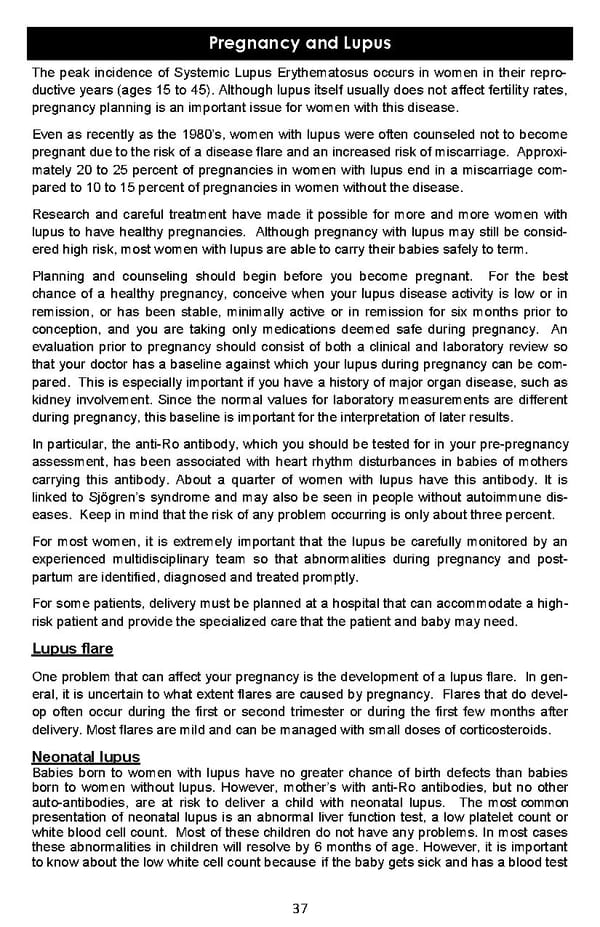Pregnancy and Lupus The peak incidence of Systemic Lupus Erythematosus occurs in women in their repro- ductive years (ages 15 to 45). Although lupus itself usually does not affect fertility rates, pregnancy planning is an important issue for women with this disease. Even as recently as the 1980’s, women with lupus were often counseled not to become pregnant due to the risk of a disease flare and an increased risk of miscarriage. Approxi- mately 20 to 25 percent of pregnancies in women with lupus end in a miscarriage com- pared to 10 to 15 percent of pregnancies in women without the disease. Research and careful treatment have made it possible for more and more women with lupus to have healthy pregnancies. Although pregnancy with lupus may still be consid- ered high risk, most women with lupus are able to carry their babies safely to term. Planning and counseling should begin before you become pregnant. For the best chance of a healthy pregnancy, conceive when your lupus disease activity is low or in remission, or has been stable, minimally active or in remission for six months prior to conception, and you are taking only medications deemed safe during pregnancy. An evaluation prior to pregnancy should consist of both a clinical and laboratory review so that your doctor has a baseline against which your lupus during pregnancy can be com- pared. This is especially important if you have a history of major organ disease, such as kidney involvement. Since the normal values for laboratory measurements are different during pregnancy, this baseline is important for the interpretation of later results. In particular, the anti-Ro antibody, which you should be tested for in your pre-pregnancy assessment, has been associated with heart rhythm disturbances in babies of mothers carrying this antibody. About a quarter of women with lupus have this antibody. It is linked to Sjögren’s syndrome and may also be seen in people without autoimmune dis- eases. Keep in mind that the risk of any problem occurring is only about three percent. For most women, it is extremely important that the lupus be carefully monitored by an experienced multidisciplinary team so that abnormalities during pregnancy and post- partum are identified, diagnosed and treated promptly. For some patients, delivery must be planned at a hospital that can accommodate a high- risk patient and provide the specialized care that the patient and baby may need. Lupus flare One problem that can affect your pregnancy is the development of a lupus flare. In gen- eral, it is uncertain to what extent flares are caused by pregnancy. Flares that do devel- op often occur during the first or second trimester or during the first few months after delivery. Most flares are mild and can be managed with small doses of corticosteroids. Neonatal lupus Babies born to women with lupus have no greater chance of birth defects than babies born to women without lupus. However, mother’s with anti-Ro antibodies, but no other auto-antibodies, are at risk to deliver a child with neonatal lupus. The most common presentation of neonatal lupus is an abnormal liver function test, a low platelet count or white blood cell count. Most of these children do not have any problems. In most cases these abnormalities in children will resolve by 6 months of age. However, it is important to know about the low white cell count because if the baby gets sick and has a blood test 37
 Living Well With Lupus Facts Booklet Page 36 Page 38
Living Well With Lupus Facts Booklet Page 36 Page 38